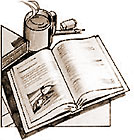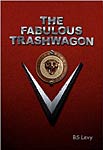
Atlas F1 Columnist
THE FABULOUS TRASHWAGON
By Burt 'BS' Levy.
Published by Think Fast Ink.
For the vast majority of you, the answer is probably quite some time. Good motorsport fiction is generally quite thin on the ground (unless you include team press releases), so when something worthwhile does come along it's more than worth making a big deal about it.
Few sports seem to have the kind of appeal to fiction writers that racing does. The reason should be obvious - motorsport is by nature an action-packed, dramatic, and in theory, unpredictable activity. The attraction in writing about car racing instead of something like golf is that a huge chunk of the work is already done for you. All you need to do is create a 'Johnny Hero', right?
That's the problem. For another element of racing's appeal are the personalities that occupy the motorsport world. And no matter how well an author manages to haul together a decent plot, they are always going to struggle to really captivate the reader, because their book will inevitably be compared with the real thing – almost certainly with unfavourable results.
This may be one reason that the best racing fiction to have hit my desk in the past couple of years has had an historic setting. Richard Nisley's 'The Ragged Edge', built around Grand Prix racing in the 1960s was one, and Burt 'BS' Levy's 'The Last Open Road' was another.
'The Last Open Road' has apparently become something of a cult hit amongst the historic racing fraternity in the USA, and it's also done pretty well for itself in other corners of the world. And with good reason. Based around the glory days of Sports Car racing in the US during the 1950s, 'The Last Open Road' was one of those rare books that the die-hard racing fans could get a kick out of, and then pass on to their less-than-entranced-by-racing better half, who would most likely enjoy it just as much.
It was followed by a sequel, 'Montezuma's Ferrari', which was just as strong as the original, and now there is a third installment to the series. If you are familiar with the first two books (or any of Levy's other writing, which includes 'The Potside Companion' and a number of contributions to assorted magazines around the planet), then you'll have a pretty good idea of what to expect from this new offering.
Buddy Palumbo, the young mechanic through whose eyes the tale unfolds, has come of age. Ill-health has gradually forced his elderly boss at the garage to take a back seat, allowing Palumbo to become increasingly involved with the running of the place, which means an ever-increasing emphasis on preparation of race cars and seemingly endless opportunities to spend every weekend traipsing around the country attending race meetings to strike a healthy mix between working and spending lots of time in the nearest bar.
But in addition to his new status at the garage, there are other responsibilities - namely the small matter of him becoming a father. Despite the difficulties in finding a balance between scooting off to races, keeping the garage running, and being a family man, Palumbo managed to realise his dream of building his own race car - even if it is a Special cobbled together from assorted Jaguar and Cadillac bits. Originally developed with the working title of the 'Jagillac', Palumbo's reliance on scrap to build the car, coupled with its rather ungainly appearance, eventually sees the vehicle dubbed 'The Trashwagon' - the ugliest, but potentially fastest - car in its class.
Levy's writing seems to mature with each novel. 'The Fabulous Trashwagon' still has all the humour of its predecessors, but the movements of the plot in this book required Levy to dig a little deeper to do himself justice, and he rose to the challenge superbly. His handling of the awful accident at Le Mans in 1955 - one of several 'real life' events that make cameo appearances in the book – is simply brilliant, and displays a level of sensitivity that was less evident in the earlier titles.
Also admirable is the seamless interweaving of reality with fiction, whether it be events such as Le Mans, or personalities who make brief incursions into the text such as Stirling Moss, Phil Hill, Smokey Yunick, and Carroll Shelby.
Like all the books in the series, 'The Fabulous Trashwagon' is a self-published effort, which draws upon the inclusion of a full colour advertising supplement disguised as a race program inserted into the centre of the book. Far from being intrusive, the insert is cleverly put together and an entertaining read in its own right.
The other thing that this book has going for it is its length. Levy is not exactly the most economical writer around (I guess one of the advantages of self-publishing is that you can make your book as long as you damn well like!), and even the speed readers out there will find that it keeps them occupied for quite some time.
Downsides? Well none, apart from the fact that unless you go to selected major historic race meetings in the US, you can't actually purchase the book just yet. It is currently being previewed at a few events around North America before being officially released on October 31st. For more details, you can email thinkfast@mindspring.com, or check http://www.lastopenroad.com.
If you read and enjoyed the previous two books then this third installment is indispensable. If you haven't read the earlier volumes, then you should take a long, hard look at yourself. Motorsport fiction doesn't get much better than this stuff.
When was the last time you read a really, really good racing novel?
Please Contact Us for permission to republish this or any other material from Atlas F1.
|
Volume 8, Issue 33
Atlas F1 Exclusive
Chemistry Class at Clermont-Ferrand
Giancarlo Fisichella: Through the Visor
Hungarian GP Preview
The Hungarian GP Preview
Local History: Hungarian GP
Hungary Facts, Stats and Memoirs
Tech Focus: GP Racing Car Engine
Columns
The Hungarian GP Quiz
Rear View Mirror
Bookworm Critique
Elsewhere in Racing
The Grapevine
> Homepage |

